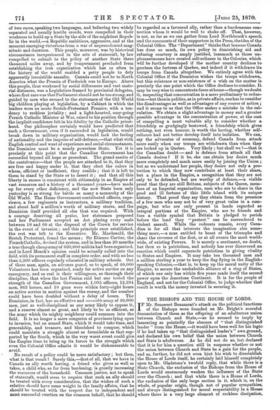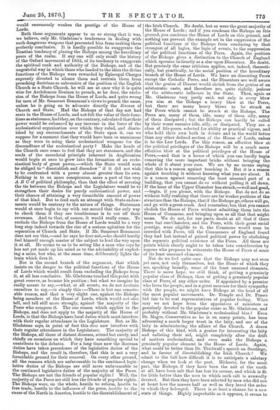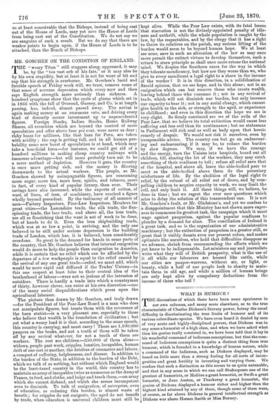THE BISHOPS AND THE HOUSE OF LORDS.
IF Mr. Somerset Beaumont's attack on the political functions= of the Bishops were founded on Mr. Bright's scornful denunciation of them as the offspring of an adulterous union, between Church and State,—as he seemed to imply by lamenting so pointedly the absence of " that distinguished leader " from the House,—it would have been well for his 'ogle if he had taken up " that distinguished leader's " own ground,. and declared his own belief that the union between Church, and State is adulterous. As he did not do so, but declared that it is for him a question still in suspense whether or not the union between Church and State be a gain for the people, and as, further, he did not even hint his wish to disestablish the House of Lords itself, he certainly laid himself completely open to Mr. Gladstone's twofold reply, that while there is a State Church, the exclusion of the Bishops from the House of Lords would enormously weaken the influence of the State over the Church ; and that while there is a House of Lords, the exclusion of the only large section in it, which is, on the whole, of popular origin, though not of popular sympathies, and always distinguished for moral respectability in a House where there is a very large element of reckless dissipation, would enormously weaken the prestige of the House of Lords.
Both these arguments appear to us so strong that it was, we believe, only Mr. Gladstone's tenderness in dealing with such dangerous weapons that prevented him from making them perfectly conclusive. It is hardly possible to exaggerate the Erastian tendency of placing the Bishops among the hereditary peers of the realm. If any one will only recall the history of the Oxford movement of 1833, of its tendency to exaggerate the spiritual rank and authority of the Bishops, and of the ungrateful way in which those who lauded to the skies the divine functions of the Bishops were rewarded by Episcopal Charges expressly directed to silence them and restrain them from preaching doctrines so subversive of the position of the English Church as a State Church, he will see at once why it is quite wise for Archdeacon Denison to preach, as he does, the exclu- sion of the Bishops from the House of Lords, and quite wrong for men of Mr. Somerset Beaumont's views to preach the same, unless he is going on to advocate directly the divorce of Church and State. Had the Bishops of that day not had seats in the House of Lords, and not felt the value of their func- tions as statesmen, had they, on the contrary, calculated that their power would be enhanced by any increase in the force of the ecclesiastical organization over which they ruled, and dimin- ished by any encroachments of the State upon it, can we suppose for a moment that they would have been so unanimous as they were in using their ecclesiastical weapons for the discomfiture of the ecclesiastical party ? Make the heads of the Church once cease to feel that they are statesmen, and the seeds of the sacerdotal principle inherent in Anglicanism would begin at once to grow into the formation of an eccle- siastical body of great power,—which the State would soon be obliged to " disestablish and disendow " if it did not wish to be confronted with a power almost greater than its own. Nothing is to us more conspicuous, more a part of the very A B C of political philosophy, than that the effect of severing the tie between the Bishops and the Legislature would be to strengthen their desire for purely ecclesiastical power, and their chance of attaining a very formidable amount of power of that kind. But to feed such an attempt with State endow- ments would be contrary to the nature of things. Statesmen would at once begin to say with one accord that the only way to check them if they are troublesome is to cut off their revenues. And to that, of course, it would really come. To exclude the Bishops from the House of Lords would be a very long step indeed towards the rise of a serious agitation for the separation of Church and State. If Mr. Somerset Beaumont does not see this,—and he says he does not,—he should hardly feel himself enough master of the subject to lead the way upon it at all. He seems to us to be acting like a man who says he has not yet made up his mind as to the advisability of explod- ing a mine, but who, at the same time, deliberately lights the train which fires it.
Nor is the second branch of the argument, that which insists on the danger to the political functions of the House of Lords which would result from excluding the Bishops from it, at all less conclusive. Mr. Gladstone touched this point with great reserve, as became his position ; but what we imagine he really meant to say,—what, at all events, we do not hesitate ourselves to say,--is simply this :—There is but one conceiv- able reason, and that a very slight one, against the Bishops being members of the House of Lords, which would not also tell, and tell still more strongly, against the majority of the Peers who compose it. The one reason which applies to the Bishops, and does not apply to the majority of the House of Lords, is that the Bishops have local duties which must interfere with their regular attendance in the Legislature. But, as Mr. Gladstone says, in point of fact this does now interfere with their regular attendance in the Legislature. The majority of the Bishops, all those of distant dioceses, attend but rarely, and chiefly on occasions on which they have something special to contribute to the debates. For a long time now the diocesan duties have taken precedence of the legislative duties of the Bishops, and the result is, therefore, that this is not a very formidable ground for their removal. On every other ground, all the reasons which are unfavourable to the continued legis- lative duties of the Bishops are still more unfavourable to the continued legislative duties of the majority of the Peers. The Bishops are not the friends of popular rights ? Well, the majority of the Peers are still less the friends of popular rights. The Bishops were, on the whole, hostile to reform, hostile to free trade, hostile to the influence of the press, hostile to the cause of the North in America, hostile to the disestablishment of the Irish Church. No doubt, but so were the great majority of the House of Lords ; and if you condemn the Bishops on this ground, you condemn the House of Lords on this ground, and nothing can prevent the example set in the suppression of the political functions of the Bishops from conducing by that strongest of all logics, the logic of events, to the suppression of the political functions of the Peers. Again, the position of the Bishops gives a distinction to the Church of England which operates indirectly as a slur upon Dissenters. No doubt. But precisely the same criticism applies, not, indeed, theoreti- cally, but practically, to the social position of the hereditary branch of the House of Lords. We have no dissenting Peers except the Catholic Peers, and the Dissenters are well aware that the genius of Dissent would shrink from the genius of an aristocratic caste, and therefore are, quite rightly, jealous of the aristocratic influence in the State. Then, again as Mr. Gladstone very justly said, not only is every blow you aim at the Bishops a heavy blow at the Peers, but there are many heavy blows to be struck at the Peers which cannot be struck at the Bishops. The Peers are, many of them, idle, many of them silly, many of them dissipated ; but the Bishops can hardly be called by their worst enemies idle, silly, or dissipated. They are a class of life-peers, selected for ability or practical vigour, and who hold their own both in debate and in the world better than any other defined section of the House of Lords, unless it be the Law Lords. For this reason, an effective blow at the political privileges of the Bishops will be a much more effective blow at the political privileges of the House of Peers,—and that is a house of which you can hardly begin removing the more important bricks without bringing the whole of it about your ears. We are by no means saying that this is a reason against touching it. But it is a reason against touching it without knowing what you are about. It is a reason against removing the least unsound part of a building, that you cannot do so without pulling it all down. If the hour of the Upper Chamber has struck,—well and good, —begin, if you please, with the Bishops. But do not do so without fully realizing that there are far weaker portions of the structure than the Bishops, that if the Bishops go, others will go, and go with a great crash. And remember, too, that you cannot abolish the House of Peers without admitting them into the House of Commons, and bringing upon us all that that might mean. We do not, for our parts, doubt at all that if there were but one Chamber, and the Peers, with their great social prestige, were eligible to it, the Commons would soon be crowded with Peers, till the Commoners of England found they had lost instead of gained political power by abolishing the separate political existence of the Peers. All these are points which clearly ought to be taken into consideration by anyone who proposes to eviscerate the House of Peers of some of its least unsound elements.
Nor do we feel quite sure that the Bishops may not even yet save, not only themselves, but the House of which they are, speaking broadly, some of the least unsound elements. There is more hope, we still think, of getting a genuinely popular class of Bishops, than of getting a genuinely popular class of Peers; of any other order. If appointed by a premier who loves the people, and in a great measure for their sympathy with the people, we might have Bishops at the head of all the most popular movements. Dr. Temple and Dr. Fraser bid fair to be real representatives of popular feeling. What may we not hope from the appointees of ministers as genuinely devoted to the popular cause as Mr. Gladstone, and probably without Mr. Gladstone's ecclesiastical bias ? Even Dr. Magee, Conservative as he L9 on many points, has been advocating a much larger trust in the laity, and use of the laity in administering the affairs of the Church. A dozen Bishops of this kind, with a genius for interesting the laity and enlisting their aid, might completely alter the drift of matters ecclesiastical, and even make the Bishops a genuinely popular element in the House of Lords. Again, what could be better than Dr. Thirlwall's speech on Sacrilege, and in favour of disestablishing the Irish Church ? We admit to the full how difficult it is to anticipate a salutary change when we look at the past. Hitherto, for the most part, the Bishops, if they have been the salt of the earth at all, have been salt that has lost its savour, and which is fit for little better than the uses to which such salt is avowedly devoted. But then they have been selected by men who did not at heart love the masses half as well as they loved the order to which they belonged. There is at least a chance for a new state of things. Highly improbable as it appears, it seems to us at least conceivable that the Bishops, instead of being cast out of the House of Lords, may yet save the House of Lords from being cast out of the Constitution. We do not say we are sanguine of such a result. But we do say that there are weaker points to begin upon, if the House of Lords is to be attacked, than the Bench of Bishops.






























 Previous page
Previous page